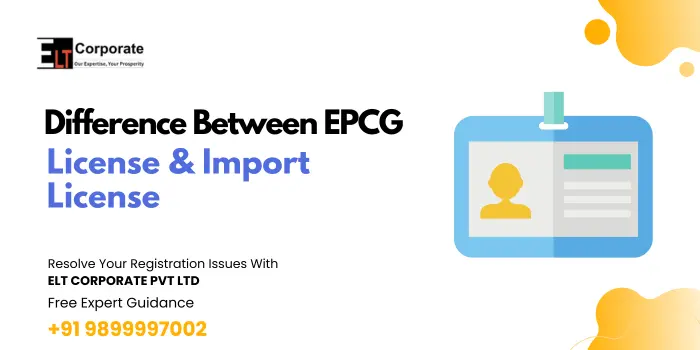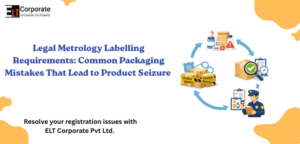Do you know the difference between EPCG License and Import License? Let’s understand, it’s important for any business involved in international trade. While both are issued by the DGFT, they serve different purposes. EPCG is meant for duty-free import of capital goods to boost exports, while an import license is required to bring restricted items into India. So let’s check out this article to understand the difference between EPCG and an Import license.
What is an EPCG License?
An EPCG license stands for export promotion capital goods license. It is a special permit issued by the Directorate General of Foreign Trade (DGFT) that allows Indian manufacturers and service providers to import capital goods at zero or reduced customs duty, provided they commit to exporting goods or services worth multiple of the duty saved. This license is part of the Indian government’s export incentives schemes and aims to promote the modernization of production facilities in India by easing the cost of capital equipment.
- Duty Saving
- Export Obligation
- Eligible Import
- Sector Covered
- Maintenance Records
What is an Import License?
An import license is an official permit issued by the Directorate General of Foreign Trade DGFT that allows businesses or individuals to legally specific goods into India from foreign countries. It is mandatory for products that are restricted or regulated under India’s Foreign Trade Policy.
While many goods fall under the free category (no license needed), certain sensitive items like defense equipment, chemicals, electronic waste, pharmaceuticals, and used machinery require prior authorization through an import license.
- Product Specific – Needed only for restricted or prohibited categories, as per the ITC (HS) classification.
- Types of Import License
- Restricted Item License – For goods not freely importable
- Advance Authorization – For the duty-free import of inputs used to manufacture export goods.
- Import of Used Machinery – Requires additional clearance, including safety and inspection reports.
- Issued By – DGFT under the Ministry of Commerce & Industry
- Validity – Usually valid for 18 months from the date of issuance
- Mandatory Compliance – Must follow labeling, quality, and safety standards from bodies like BIS, CDSCO, AERB, etc.
Purpose of EPCG License vs. Import License
The purpose of an EPCG license is to help exporters in India by allowing them to import machinery or equipment without paying customs duty, as long as they promise to export products or services worth six times the saved duty within a fixed time (usually 6 years). It is meant to boost exports and make Indian products more competitive.
The purpose of an Import License is to control the import of restricted goods like used machines, medicines, or defence items. It makes sure that only approved items enter the country and follow Indian laws and safety rules.
- EPCG License – Support for exporters to import machines duty-free
- Import License – Permission to import restricted or controlled goods legally.
Eligibility Criteria for EPCG License and Import License
To apply for an EPCG license, any exporter of goods or services in India is eligible, whether a manufacturer, exporter, or merchant exporter tied to a supporting manufacturer. The primary condition is meeting the export obligation set under the schemes. For an import license, eligibility depends on the product category. It is mainly required for importers bringing in restricted items such as listed by the DGFT under India’s import policy.
Application Process for EPCG and Import License
Follow these steps to apply for the EPCG and import license. We tried to make it as simple as possible for you to get the license.
Application Process for EPCG License:
- Register on DGFT Portal – The applicant must create a login on DGFT website.
- File ANF 5A Form – Submit the application form ANF 5A along with required documents like IEC, RCMC, digital signature, etc.
- Upload Project Details – Provide complete information about the capital goods to be imported under te EPCG scheme.
- Pay the Fee – Now you have to pay the required government fee online.
- DGFT Review and Approval – The DGFT will check the application and issue the EPCG authorization if all conditions are met.
Application Process for Import License:
- Identify Restricted Items – Confirm whether the product you want to import falls under the restricted category by DGFT.
- File ANF 2M Form – Submit application form ANF 2M through the DGFT portal along with product details, IEC, Justification letter, and technical literature
- Pay Application Fee – Now you have to pay the required government fee online
- Get Recommendation – For specific goods, prior recommendation from technical bodies may be needed.
- DGFT Scrutiny & License Issuance – DGFT verifies documents and grants the import license upon approval.
Documents Required for EPCG and Import License
Please check the list of documents needed for the EPCG license:
- IEC Certificate (Import Export Code)
- RCMC (Registration Cum Membership Certificate) from an Export Promotion Council
- Digital Signature Certificate (DSC)
- Self-Certified Copy of PAN Card
- Company Incorporation Certificate / Partnership Deed
- Copy of GST Registration
- Product / Project Details, including technical specifications of the capital goods
- Export Obligation Calculation Sheet
- Chartered Engineer Certificate for Capital Goods
- Undertaking/Declaration
- Past Export Performance
- Address Proof of Manufacturing Unit
Documents required for import license application:
- IEC certificate (Import Export Code)
- GST Registration Certificate
- PAN Card of the Company
- Form ANF 2M
- Technical Details of the Item to be Imported
- Justification Letter for the import of restricted items
- Product Catalogue or Brochure
- Purchase Order or Proforma Invoice
- Authorization Ltter
- DSC (Digital Signature Certificate)
- Recommendation Letter
- Declaraton Regarding End Use of the Product
Validity Period and Compliance Requirement
Here you can check out this table to know the validity period and compliance requirements:
| S.No | Criteria | EPCG License | Import License |
|---|---|---|---|
| 1. | Validity Period | 18 months for import, 6 years to fulfill export obligation | 12-18 months, depending on the product and approval |
| 2. | Compliance Requirement | Submit proof of export, meet export obligations, and maintain a record | Use within validity, follow customs & regulatory rules |
| 3. | Issued By | DGFT (Directorate General of Foreign Trade) | DGFT or the concerned ministry based on product type |
| 4. | Penalty for Non-Complaince | Fine, license cancellation, blacklist | Import restriction, seizure, or penalty |
Why Choose ELT Corporate for EPCG and Import License Assistance?
ELT Corporate is the best regulatory consultancy in India. We simplify the entire process, right from the documentation to approvals, so you can focus on your business without stress.
- Expert team for DGFT filings, customs documentation & compliance
- End-to-end assistance from application to license grant
- Fast, transparent, and affordable service
- PAN India service coverage
- Trusted by 2500+ clients across industries
- Dedicated account manager for personalised support
- Real-time updates and status tracking
- Experience with complex industry-specific licensing cases
- Assistance with post-license compliance and renewals
- Strong coordination with DGFT and Customs Authorities
Still, if you are confused, you can directly call 9899997002 or write an email to info@legalmetrologyindia.com.
Is an EPCG License the Same as an Import License?
No, an EPCG license is not the same as the import license because EPCG allows duty-free import of capital goods for export promotions, and an import license is required to import restricted items into India.
Who Issues EPCG and Import Licenses in India?
Both EPCG and import licenses are issued by the DGFT under the Ministry of Commerce & Industry.








